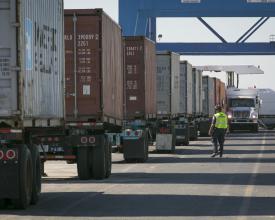House Passes Bill Targeting Trade Crimes
My thanks to DHA members for your support as we close out 2024 with our last issue of the newsletter for this year. We know that this year has been challenging for many parts of our industry as we have seen slower markets and increased imports. At DHA, we look forward to 2025 which will hopefully produce increased markets encouraged by lower inflation and lower interest rates that will boost homebuilding.
On the policy side, we are hopeful that the new administration will reduce unnecessary regulation and support U.S. manufacturing over imports from China and other countries that practice unfair trade, particularly countries in Asia.
Finally, I’d like to wish you all a merry Christmas, happy holidays, and a happy New Year!!
Expect the first DHA eNews of 2025 in your inbox on Thursday, January 9.
If you have questions or comments, contact me. I look forward to hearing from you.

Keith A. Christman, President
Decorative Hardwoods Association
PHOTO © U.S. CUSTOMS & BORDER PROTECTION

Lawmakers in the U.S. House of Representatives recently passed the bipartisan Protecting American Industry and Labor from International Trade Crimes Act of 2024—unanimously. The bill will help fight international trade crimes by establishing a new task force within the Department of Justice dedicated to prosecuting trade fraud, duty evasion, transshipment, and other trade-related offenses.
The European Union has agreed to postpone the implementation of the EU Deforestation Regulation until December 30, 2025. After the successful plenary vote this week, the final official step is publication in the EU journal before the end of the year. The EU has rejected the creation of a "no risk" category intended to provide flexibility for countries that practice sustainable forestry.
The American Hardwood Export Council has intensified the process of developing a risk-based jurisdictional response to the EUDR over the last few months. Even though a one-year delay to the implementation of the law now seems inevitable, AHEC Europe has been pushing ahead with plans to deliver a risk-based mechanism for U.S. hardwoods that demonstrates their legality and the negligible risk of deforestation at the county level—throughout all 33 hardwood-producing states.
We are still waiting for lawmakers to extend funding for farm bill programs before the end of the year. The farm bill includes financial support for forest management practices, export promotion programs, and incentives for landowners to maintain healthy forests. Those in the know are hopeful that a year-long extension will be attached to the continuing resolution that is currently under discussion. Still in question are the dollar amounts of key funding provisions, including funding for farmers suffering financial losses.
In a victory for small businesses, a federal court issued a nationwide injunction to suspend the enforcement of disclosure requirements, known as Beneficial Ownership Information reporting, under the Corporate Transparency Act. The act took effect this year and required most businesses to report the personal information of their owners and managers to the Financial Crimes Enforcement Network. Although the court action granted a reprieve, it has already been challenged.
The Forest Stewardship Council recently added 18 months to the time a Chinese bamboo plywood manufacturer is blocked from FSC certification. FSC stated that the manufacturer repeatedly made false claims on large volumes of bamboo plywood. The manufacturer was originally blocked in 2022 for making false claims. FSC found evidence that the company recertified itself under a different name without disclosing its history—and continued to make false certification claims on its products.
U.S. imports of wooden furniture rose by 3% in October, continuing their climb toward the all-time highs of two years ago. Imports rose above $1.9 billion in October for the first time since 2022. October's imports were 9% higher than the previous year. Imports from Malaysia soared by 25% in October alone, breaking the $100 million mark for the first time in two years. Year-to-date imports from Malaysia are up by 7%. Total U.S. imports of wooden furniture are also up by 7% this year.
NexGen Cabinets will invest nearly $7 million to build a cabinet assembly and manufacturing plant in North Carolina, creating more than 40 jobs. The facility will manufacture kitchen and bathroom cabinets for the multifamily residential wholesale market. NexGen is a division of Honsoar International, a global manufacturer of kitchen and bathroom furniture with plants in Malaysia, Vietnam, and Cambodia.
This has not been a great year for any part of the forest industry. An upturn is unlikely in the short term. Typically, when one sector of the forest products market declines, others improve. That isn't the case now. However, experts see reason for hope.
The market for architectural and custom woodwork continued to soften, as measured by the AIA/Deltek Architecture Billings Index. September's index held steady at 45.7. All regions reported declines, although at a slower pace in the South and Northeast. Companies specializing in commercial and industrial projects were at 44.2, multifamily residential at 41.7, and those involved in institutional projects registered at 48.5. On a positive note, in a recent survey by the Architectural Woodwork Institute, all firms reported increases in gross profits and contribution margins.
Experts spent a full year completing risk assessments for U.S. hardwoods to evaluate all aspects of legal compliance throughout the industry. A sophisticated framework was used to assess the level of risk of illegal activities present within supply chains, from point of harvest to point of export, across all 33 hardwood-producing states. Full reports for each state will be published in January.
The U.S. Department of Agriculture provided nearly $335 million to strengthen financial incentives for private forest landowners to manage their forests sustainably and to permanently conserve private forests in partnership with states. Nearly $210 million of the total was competitively awarded to state agencies, private entities, and nonprofits.
Researchers at the Michigan Technological University reported that Great Lakes oak trees are at risk due to climate change. The threats reported include rising temperatures, severe rainstorms, and increased susceptibility to plant-eating animals and disease-causing microorganisms.
From which national forest is this year’s U.S. Capitol Christmas Tree?
Answer: This year, the tree will come from the Tongass National Forest—America's largest national forest. Previously, the only other U.S. Capitol Christmas Tree to come from Alaska was sent from the Chugach National Forest in 2015.





